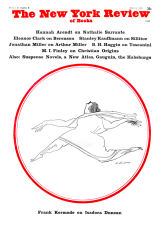In response to:
Out of This World from the February 6, 1964 issue
To the Editors:
Robert Brustein’s side-swipe at Sidney Hook’s book, The Fail-Safe Fallacy, in his review of Dr. Strangelove displays an inordinate capacity to miss the point. He calls Hook’s book an “embarrassing performance” because it contains “some eighty-odd pages of closely reasoned, technical argumentation to refute the premise of cheap best-selling fantasy.”
Is it Brustein’s argument that Professor Hook’s book ought not to have been written because Fail-Safe was inartistic? So it seems. But whatever the artistic merits of Fail-Safe, Hook’s book was not directed at them. His was not a book of literary criticism. Rather it was an attempt to prevent this best-selling book from giving currency to a pernicious notion about our defence establishment, viz. that a plane carrying atomic weapons might start an accidental war because of the absence of a safety precaution which in fact is included in our deterrance strategy. Brustein’s clever-silliness only muddies what Hook tries to clarify. In this already overwhelmingly complicated world, the addition of confusion only earns contempt.
Kenneth Stern
Department of Philosophy
New York University
Robert Brustein replies:
Although it is rather odd to find professors of philosophy functioning as patriotic watchdogs and apologists for our “defense establishment,” I have no objection to Professor Hook combatting the “pernicious notions” now being spread about our “deterrence strategy.” His confidence in the safety of our military controls is consoling, if not altogether convincing. And while his rationalistic approach to an irrational problem may not allay the anxiety in our hearts, he has a perfect right to cheer himself up, as well as others who think like him. On the other hand, I certainly do believe that The Fail-Safe Fallacy should never have been written. It goes without saying that Professor Hook’s assaults on the misconceptions of Fail-Safe were not acts of literary criticism, but that such a trivial piece of fiction should provide the occasion for any kind of criticism—scientific, political, literary or otherwise—shows, on the one hand, a lack of measure, and, on the other, an incapacity to distinguish between the imagination and reality, even on the lowest levels of entertainment.
To be frank, I haven’t the slightest interest in Fail-Safe or in Professor Hook’s rigid rationalism. For years, Professor Hook has been suffering from an exaggerated sense of causality. He has apparently come to believe that every thought, no matter how fantastic or frivolous, will have an immediate, lasting effect upon the safety of the “free world.” Now it is my belief that this kind of humorless vigilance leads to the very opposite of freedom; it is a symptom of that doctrinaire literalism that sometimes makes it difficult to tell the “free world” from its “peace-loving” enemies. Camus called realism the official aesthetic of totalitarianism because the ideologoical mind is unable to distinguish art from actions—everything is weighed for its effect upon “reality,” which is to say the security of the body politic. Professor Stern will forgive me if I evince less interest in the body politic than in the spirit imaginative, and it is to guard that last refuge of freedom against the vigilantes and the watchdogs that I would say to him: there is a vast difference between the poetic and the political mind; there are more things in heaven and earth than are dreamt of in your philosophy department.
This Issue
March 5, 1964



